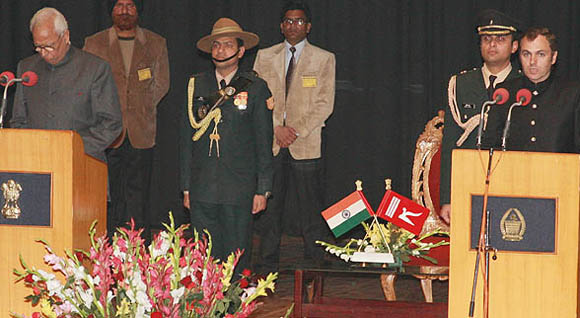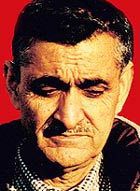Political Posturing About AFSPA
 |
|
POLITICAL POSTURING AND PUBLIC SPATS ABOUT AFSPA
*-P.N.Ganjoo |
 |
|
The bane of Indian politicians both old and young is that they do not hesitate to exploit the system for their survival and continuance. Chief Minister Omar Abdullah’s regime has been tottering under its own weight of irresponsible omissions. He has therefore been making equally irresponsible and unethical moves to brace up his regime. He has not hesitated to play with sensitive and emotive issues to divert public attention from his failures and lapses as the C.M. of Jammu & Kashmir state. The latest indulgence was his statement some time back that he is likely to recommend withdrawal of AFSPA from two Districts each from Jammu and Kashmir Divisions. He also stated that he is going to revoke DAA from the state so that he is able to withdraw AFSPA without any difficulty. He has made these announcements unilaterally without consulting other stakeholders of terrorism management. This is also despite the fact that two core committees constituted by him in Jan 2011 to go into the feasibility of such a move, have not agreed for such an immature move at this stage. The committees feel that peace has not yet been restored in the state to stake such a risky move. These two committees comprised of the high offices of DGP and Home Secretary of the J&K state and two Army Core Commanders from Jammu and Kashmir Divisions.
Even other vested interests are trying to misinform and confuse the public regarding invoking of DAA and extension of AFSPA in the state. Though both these are central acts they can be applied and invoked only after state government recommends and requests these when the local police and civil administration fails to maintain peace and order. The acts were invoked in the state after Pakistan sponsored militancy erupted in the valley in 1989. It was only with a view to combat and confront the grim situation of complete collapse of civil administration and to restore law and order that the acts were invoked with a purpose to arm the security forces with sufficient insulation and powers. The acts were invoked to restore peace and order for law abiding citizens of the state. It is only after state was declared a disturbed area that Army and Para-military forces were requisitioned on special duty to help the government in resurrecting civil administration which had earlier abdicated and gone into hiding. To enable Army and Para-military forces to function in such situations, it is necessary to vest them with special powers of search, arrest and shoot in extraordinary circumstances. Without these powers these forces have no powers in civilian areas and therefore their deployment has no sense. These powers are needed so that these forces do not get embroiled in unnecessary legal complicacies at the hands of unscrupulous elements. These are the powers that every modern democratic state vests in its security forces to protect the state from subversion by saboteurs. It may be relevant to state that it is not the use of these powers; rather it is the dread of these powers that works as a deterrent for restoration of peace and order in such disturbed areas. These two acts have been invoked in the valley since 1990 and stand extended to the entire state from 2001. It is open history that Army has not utilized these acts more than two or three times since they were imposed and extended. So it is not a fact that existence of these acts in the state has been a public offensive on the people. So the plea that these acts are public sensitive and emotive does not carry any weight at all. Rather it is a blatant attempt of misinformation, designed to not to inform the people of the valley of real facts and issues. Local police has used these powers more frequently to shore up their efforts against foreign sponsored terrorist acts. Politicians and public leaders are required to educate people of real issues and not to misguide them with bogies. This is exactly the reason why both Core Committees constituted by the CM have not recommended revoking of DAA and withdrawal of AFSPA at this stage, when guns of the foreign sponsored terrorists have not been silenced for good. There are still sporadic outbursts which if allowed unabated will wash out the gains made by the security forces through their sustained efforts of terrorism management. They rightly feel that though militancy has waned a great deal, yet the situation is not conducive to risk withdrawal of these acts without further damage to fragile peace of the valley. It is a known fact that terrorists operate through ambush and deceit. Agreeing to the suggestion of the CM to create safe havens for the terrorists by revoking DAA and withdrawing AFSPA from these four districts will be a God sent gift to the terrorists to target other areas for violence and then to fall back in these four districts . The committees apprehend that such an ill-timed move may push valley backwards to the nineties and all the gains and fruits of counter terrorist activities may be lost. Omer Abdullah’s advocacy for partial withdrawal of these acts has kicked a hornet’s nest. It has created more problems than it intends to solve. The difference of opinion between MoD and MoH has come into the open. Though it is believed that CM has implicit blessings of Home Minister of India for his loose indulgences, the MoD is in total disagreement with the intended move. It feels that such a move could be counter-productive at this stage. Even the people of the state are not enthused with this erratic suggestion of the CM .Except PDP and the separatists, all main line national parties are against such premature moves which could boomerang on them. Normally it was expected of the CM to have consulted not only the coalition partner but also opposition parties in the state before making his thinking aloud on such a vital national security issue. But being over-eager to shore up his ebbing reputation, he ignored them all. He shall not be able to contain and tame the vociferous opposition which is ready to take cudgels on this issue of national importance, especially from Jammu and Ladakh. The BJP and the Panthers Party have already sounded the bugle against the move which has become public emotive and national sensitive at the national level. AFSPA is a central act which can be invoked by the centre but only on state’s recommendation. So it can not be revoked unilaterally by state government as CM Omer Abdullah seems to think. It was therefore that Northern Army Commander KT Parnaik in his meeting with the Governor and Cabinet and Home Secretary of India revealed certain facts which need to be appreciated in proper perspective. He stated that the present thaw in terrorist activities leading to atmosphere of peace was not due to operations of Army under AFSPA but the presence of the Army in the barracks in the valley. It is not the operations but the dread of the operations that works as a deterrent for the terrorists to lay low and join the peace process. He also reported that it would not be possible to restore imposition of the law at short notice, as and when state government needs and demands. So the Army cannot come to the rescue of the civil administration at short notice to restore law and order in a disturbed area after AFSPA is revoked. Therefore these essential laws, which are vital for national security and integrity need not be withdrawn on extraneous grounds. He has further informed that Army has not operated these laws since last 15 years. While the Army is stationed at Tatoo Ground and Badamibagh at Srinagar it has not operated under above acts for 15 years, except in some outskirts of Sopore town. Assam has these laws since 1958, where Army continues to remain in the barracks and operates only as and when state administration requisitions it. Once it was withdrawn from Imphal in 2004 the secessionist forces resurfaced and law and order situation reverted back to chaos and confusion. It was only after AFSPA was re-imposed that peace and order was reestablished but at a great additional human and material cost. Governance in a democratic Republic like India is run on fundamental principles of separation of powers which assign specific powers to different organs of government. Though all organs of governance have to work their assigned roles independently they have to work in unison and tandem. They cannot think and act at cross purposes. Army as an organ of administration in disturbed areas has a duty to perform as per its standard norms and procedures. Our Army being second to none in its technical and strategic prowess and also known for its apolitical nature needs no lessons from the politicians. It would also be not desirable for one single organ of administration to decide on matters of national security. Every organ of governance including the Army has to think on issues of broad national interest. It cannot be browbeaten by a politician beaten down by short-term compulsions. |
|
|
|
Presently he is working on his varied interests besides being a consulting Director of a software services company. |
|
|
| Copyrights © 2007 Shehjar online and KashmirGroup.com. Any content, including but not limited to text, software, music, sound, photographs, video, graphics or other material contained may not be modified, copied, reproduced, republished, uploaded, posted, or distributed in any form or context without written permission. Terms & Conditions. The views expressed are solely the author's and not necessarily the views of Shehjar or its owners. Content and posts from such authors are provided "AS IS", with no warranties, and confer no rights. The material and information provided iare for general information only and should not, in any respect, be relied on as professional advice. Neither Shehjar.kashmirgroup.com nor kashmirgroup.com represent or endorse the accuracy or reliability of any advice, opinion, statement, or other information displayed, uploaded, or distributed through the Service by any user, information provider or any other person or entity. You acknowledge that any reliance upon any such opinion, advice, statement, memorandum, or information shall be at your sole risk. |
 *P.N.Ganjoo was born in a modest Kashmiri family about 7 decades ago, lost his father early and was raised by his honest, hardworking mother. With her efforts he received his education in Srinagar and went on to serve in various Government Departments before retiring as a senior grade KAS officer.
*P.N.Ganjoo was born in a modest Kashmiri family about 7 decades ago, lost his father early and was raised by his honest, hardworking mother. With her efforts he received his education in Srinagar and went on to serve in various Government Departments before retiring as a senior grade KAS officer.